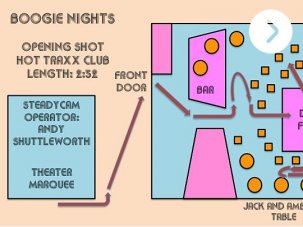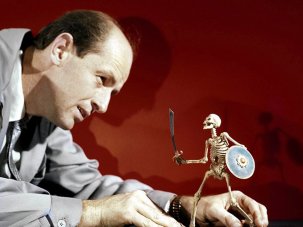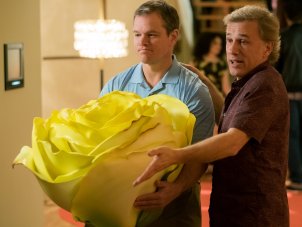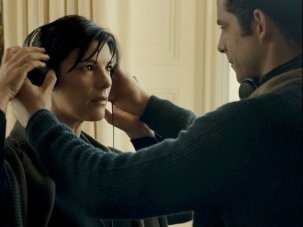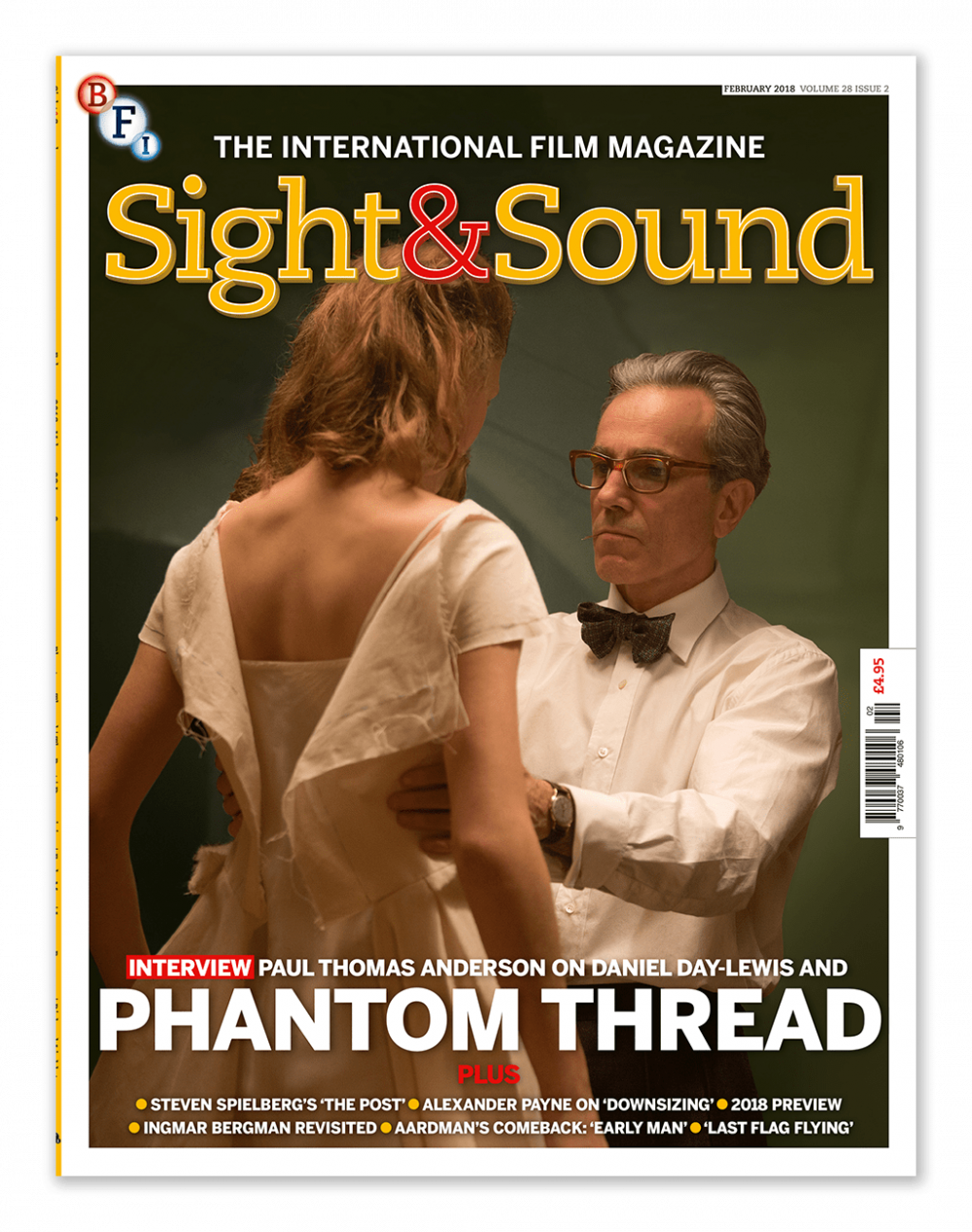
In our February issue we sit down with one of the major directors in the world today, Paul Thomas Anderson, to discuss his brilliant and characteristically singular eighth feature Phantom Thread, which draws from the deep well of the gothic romance to tell a tale of the tainted love between an obsessively exacting couturier and a young woman who refuses to be simply another disposable muse, set amid the sumptuous world of high-end fashion and polite society in 1950s London. Across six pages, in a generous interview, Anderson talks to James Bell about the attractions of working in the gothic romance mode, his love of mid-century British filmmakers such as David Lean and Michael Powell, the challenges of navigating (and joy of researching) the complex rules of the English class system, and his love of breakfast, not to mention the experience of working with Daniel Day-Lewis on what the actor says will be his last film.
Posted to subscribers and available digitally 8 January
→ Buy a print issue
→ Access the digital edition
→
On UK newsstands 11 January
If Anderson’s film finds the rigid codes of English society to be perfect terrain for the explosive secrets and dark passions of the gothic romance, Nick Park’s Aardman Studios have instead always found the foibles of British life and culture ripe for gentle mockery, something they look to continue to do in their latest feature, Early Man, in which a group of cavemen cut off in a remote village are forced to challenge their Bronze Age invaders to a football match to win back their freedom. Nick Bradshaw visits the Aardman’s Bristol studios to see the painstaking work that goes into making an Aardman animation, and speaks to Nick Park about the influence of Ray Harryhausen in creating the film’s prehistoric world, working with Tom Hiddleston and Eddie Redmayne, and spotting the gap in the market for the underdog prehistoric sports movie.
Also working in miniature is Alexander Payne, who has been working up his Lilliputian parable Downsizing since the days of his Sideways in 2004 – and more pertinently George W. Bush’s re-election as US president. “We waited so damn long, but now, with Trump in power, there are certain images in the film that have more potency than they might… None of the elements of the film is new, but a couple of them, particularly the idea of Mexicans living behind a wall, have a certain resonance that they might not have had previously,” he tells Philip Horne, in a discussion that covers political injustice and satire, different depths of irony and his regrets around the film.
More on the nose is Steven Spielberg’s The Post, a rousing replay of how Daniel Ellsberg and the Washington Post broke the Pentagon Papers story that proved US government duplicity and illegality in the waging of the Vietnam War, starring (inter alia) Tom Hanks as Post editor Ben Bradley and Meryl Streep as his publisher Katharine Graham. “What could be more pungent, more magnifying, in this our bloodshot year of caveman power grabs, alternative facts and renewed media relevance,” asks Michael Atkinson? Except – for all our rich lineage of muckraking newspaper films and true-life political exposés, how much has the awareness and outrage they inspire actually changed anything, asks Atkinson? “Is Spielberg’s emphatic visual palette and swelling music and inspiration cant ironically intended? Or is the film just as naive as we all were those many decades ago, thinking that publishing something in the newspaper would change the abuses of state power all by itself, instead of needing us to understand and then to act on the information as a citizenry?”
Moving from the secular and profane to a doubt more sacred, we revisit the spiritually wracked cinema of Sweden’s master melancholiac Ingmar Bergman, whose star has waned since the days when, as Leslie Mallory wrote in 1958, “You can get tickets for My Fair Lady more easily than for the summer-long season of Bergman’s films now running at the National Film Theatre.” As Catherine Wheatley follows up, “It’s hard to imagine that the forthcoming BFI Season marking Bergman’s centenary will be outselling Hamilton; still, it’s possible that contemporary audiences might find a poignancy in Bergman’s idiosyncratic brand of existentialism, and in particular its concern with what to believe in after the death of God.” Comparing at Bergman’s sometime-mocked Faith Trilogy – Through a Glass Darkly, Winter Light and The Silence – and its implacable turn towards the “metaphysical fallout of the end of Western values” with a renewed sense of cultural anxiety about our loss of connection, meaning and purpose, Wheatley proposes that “with the age of irony withering”, perhaps Bergman’s earnestness might have a renewed resonance.
Features
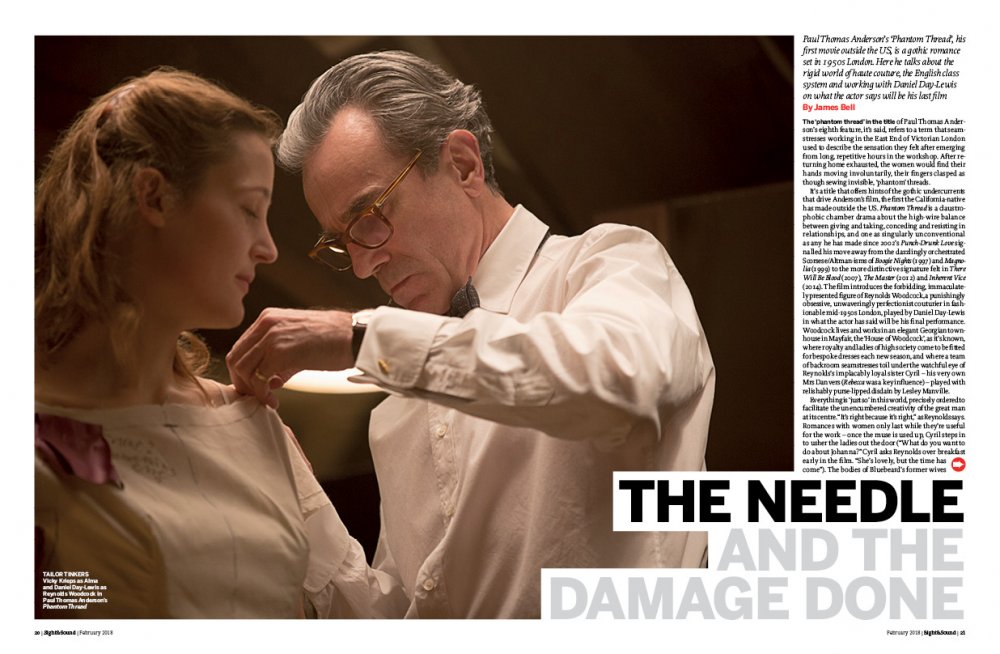
Phantom Thread: The Needle and the Damage Done
Paul Thomas Anderson’s Phantom Thread, his first movie outside the US, is a gothic romance set in 1950s London. Here he talks about the rigid world of haute couture, the English class system and working with Daniel Day-Lewis on what the actor says will be his last film. By James Bell.
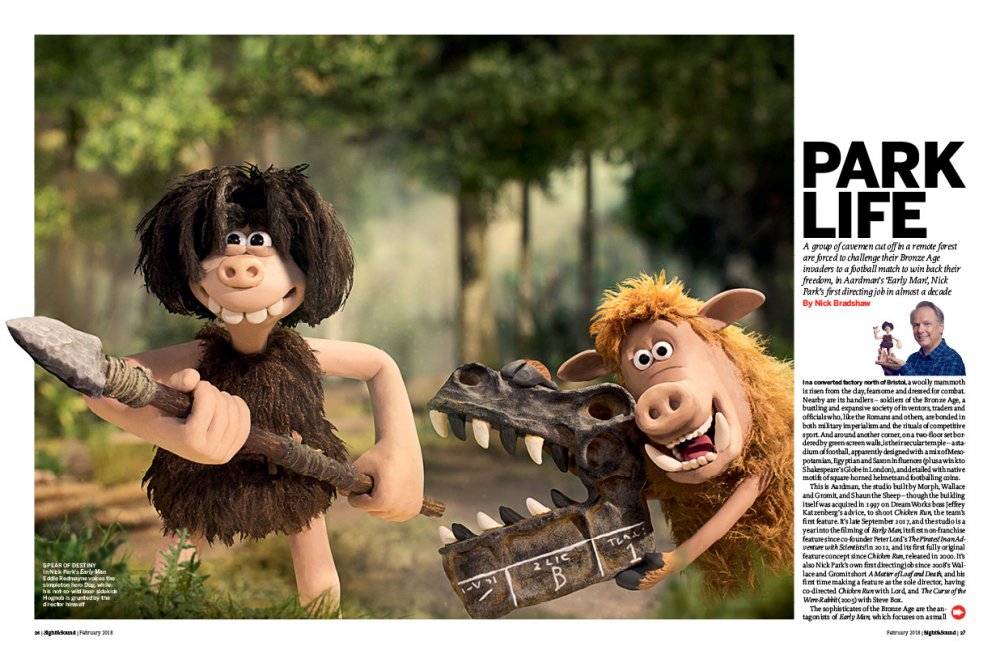
Park Life
A group of cavemen cut off in a remote forest are forced to challenge their Bronze Age invaders to a football match to win back their freedom, in Aardman’s Early Man, Nick Park’s first directing job in almost a decade. By Nick Bradshaw.
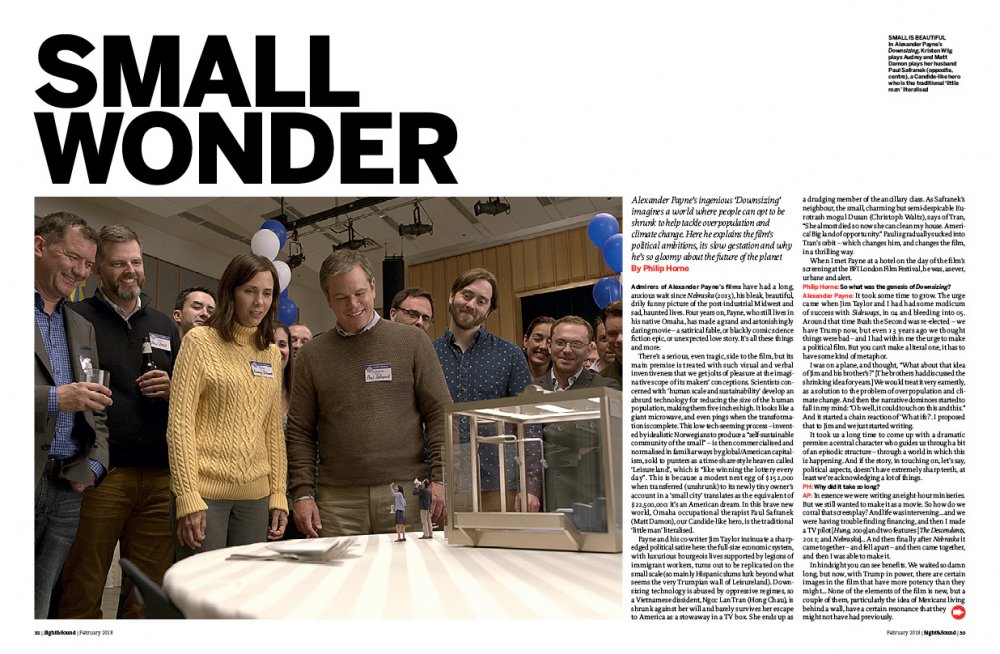
Small Wonder
Alexander Payne’s ingenious Downsizing imagines a world where people can opt to be shrunk to help tackle overpopulation and climate change. Here he explains the film’s political ambitions, its slow gestation and why he’s so gloomy about the future of the planet. By Philip Horne.
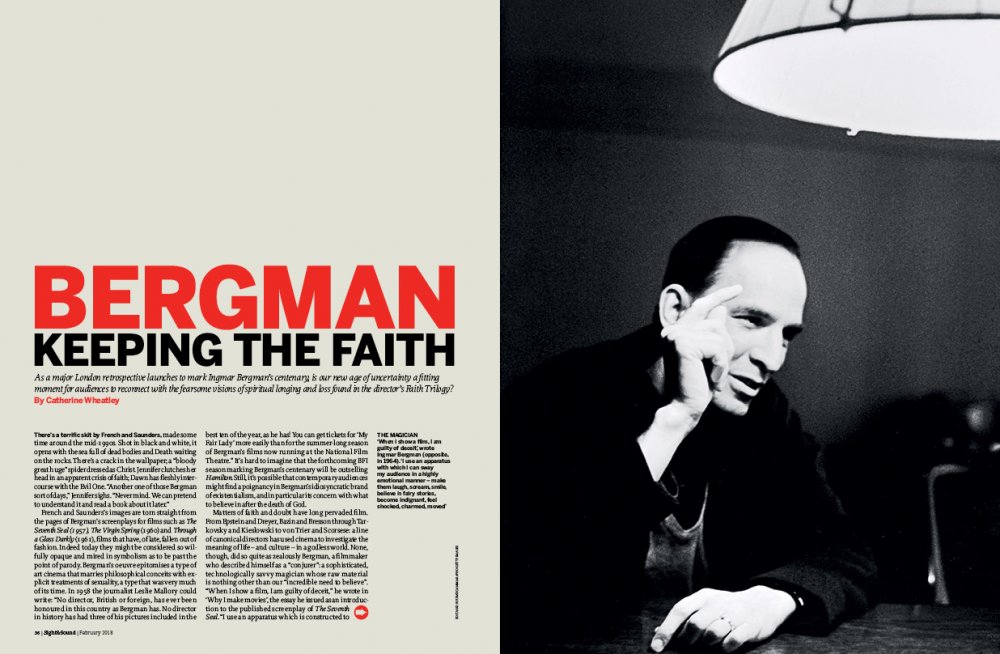
Keeping the Faith
As a major London retrospective launches to mark Ingmar Bergman’s centenary, is our new age of uncertainty a fitting moment for audiences to econnect with the fearsome visions of spiritual longing and loss found in the director’s Faith Trilogy? By Catherine Wheatley.
+ ‘It can never be more fun’
This account of a visit to the set of Ingmar Bergman’s Fanny and Alexander in 1982, from the Sight & Sound archive, found the director in an ebullient mood. By Peter Cowie.
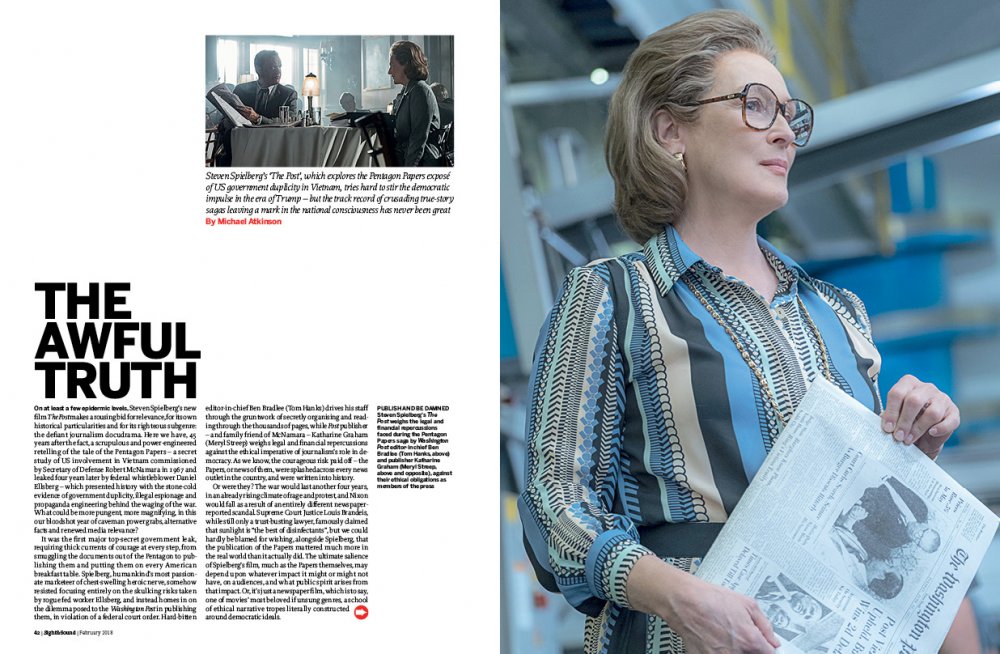
The Awful Truth
Steven Spielberg’s The Post, which explores the Pentagon Papers exposé of US government duplicity in Vietnam, tries hard to stir the democratic impulse in the era of Trump – but the track record of crusading true-story sagas leaving a mark in the national consciousness has never been great. By Michael Atkinson.
Regulars
Editorial
Category error
Rushes
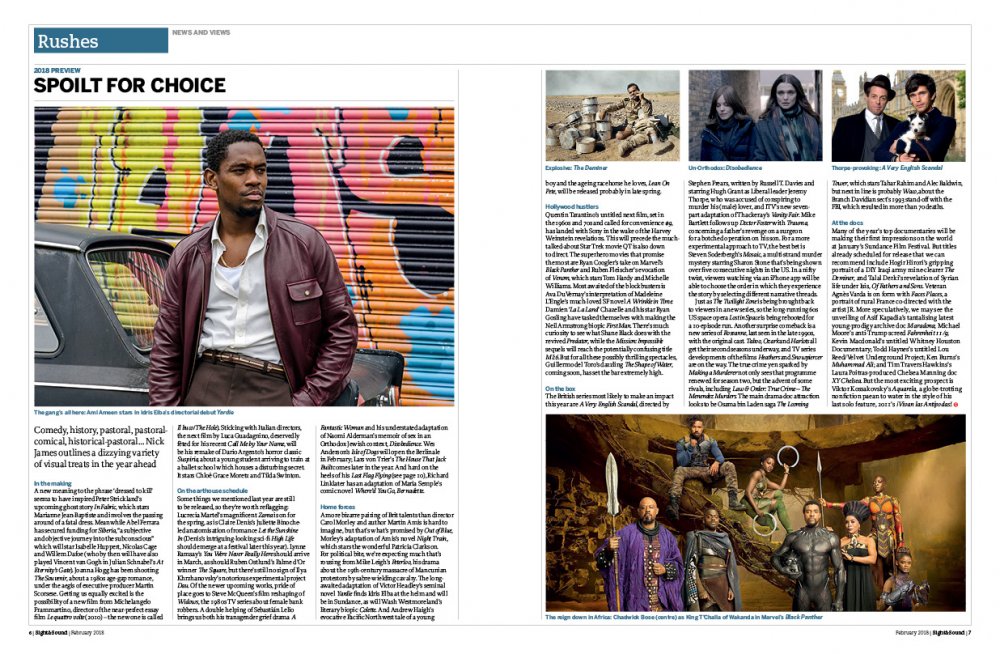
Our Rushes section
2018 preview: Spoilt for choice
Comedy, history, pastoral, pastoral-comical, historical-pastoral… Nick James outlines a dizzying variety of visual treats in the year ahead.
Interview: Songs in the key of life
Song of Granite, Pat Collins’s moving portrait of the life of an Irish folksinger, offers a subtle portrait of a lost culture. By Philip Concannon.
The numbers: Review of the year
Charles Gant tots up 2017’s box office.
Interview: It shouldn’t happen to a vet
Richard Linklater’s Last Flag Flying follows three former comrades-in-arms on an American odyssey, in a loose follow-up to The Last Detail. By Philip Horne.
Dispatches: The 24-hour sublime
For a change, let’s imagine that this column isn’t a column at all, but a great series of moving, exciting and funny film clips. By Mark Cousins.
Wide Angle
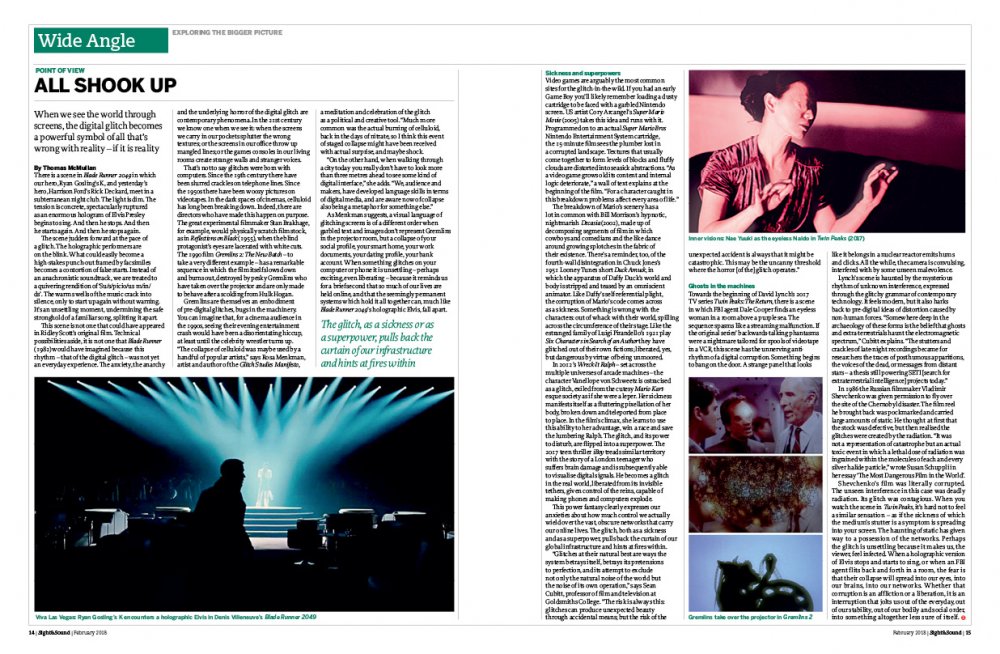
Our Wide Angle section
Point of view: All shook up
When we see the world through screens, the digital glitch becomes a powerful symbol of all that’s wrong with reality – if it is reality. By Thomas McMullan.
Primal screen: Paradise remade
When a film is lost forever, the only way to see it may be to make it all over again – and who knows what we might learn in the process? By Pamela Hutchinson.
Festival: Powers of observation
The main prize at Tokyo FILMeX was shared by two Indonesian directors – but their work was overshadowed by another film. By Tony Rayns.
Reviews
Films of the month
Lover for a Day
The Nothing Factory
A Woman’s Life
plus reviews of
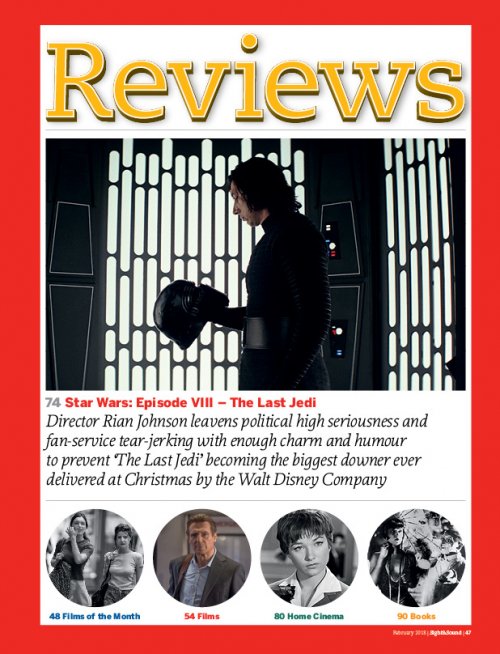
Our Reviews section
The Bachelors
Brad’s Status
Brigsby Bear
Coco
The Commuter
Darkest Hour
Downsizing
Eric Clapton: Life in 12 Bars
Ferdinand 80
The Final Year
Glory 83
The Greatest Showman
Journey’s End
Jumanji: Welcome to the Jungle
Jupiter’s Moon
Last Flag Flying
Lies We Tell
Love Is Thicker than Water
Makala
Phantom Thread
The Post
Renegades
Rey
Roman J. Israel, Esq.
Song of Granite
Star Wars: Episode VIII – The Last Jedi
Tempestad
Three Billboards Outside Ebbing, Missouri
The Unseen
Walk with Me
Youth
Home Cinema features
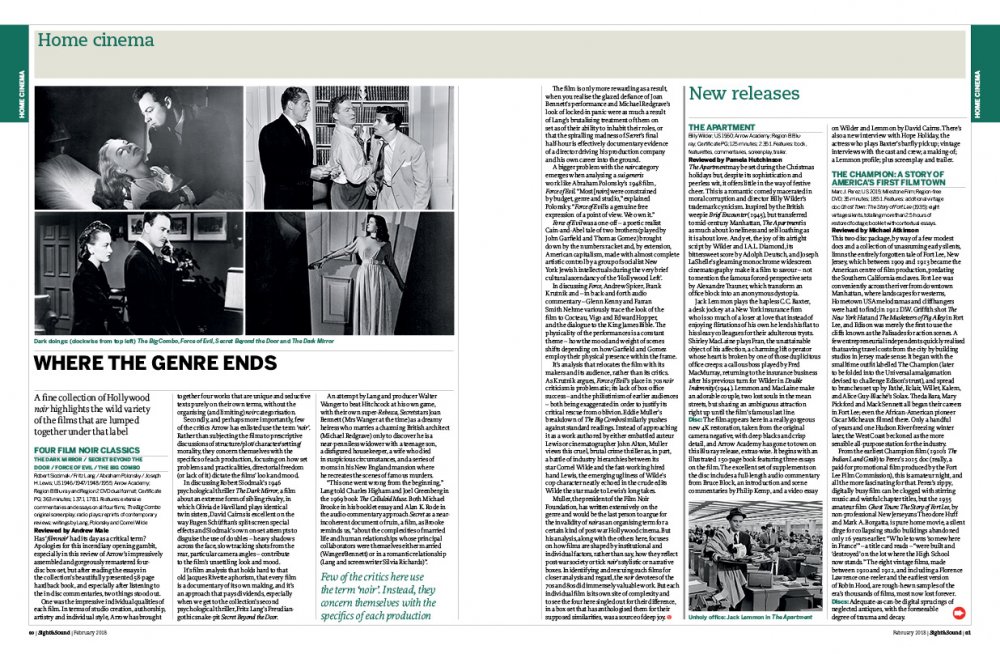
Our Home Cinema section
Where the genre ends: Four Film Noir Classics
A fine collection of Hollywood noir highlights the wild variety of the films that are lumped together under that label. By Andrew Male.
Rediscovery: Suspiria
Forty years after it was released, Dario Argento’s visionary horror classic looks more bizarre and more gorgeous than ever. By Michael Blyth.
Rediscovery: Eight Films by Jean Rouch
In his pioneering documentaries, the French filmmaker Jean Rouch explored the vast diversity of Africa – and gave Africans a voice. By Nick Pinkerton.
Lost and found: Four Friends
Late in his career, Arthur Penn directed some clunkers – but this downbeat, intelligent tale of 60s America isn’t one of them. By Geoff Andrew.
plus reviews of
The Apartment
The Champion: A Story of America’s First Film Town
Guns at Batasi
Hammer Volume One: Fear Warning!
The Private Life of Sherlock Holmes
Pulp
The Pumpkin Eater,
The Sword of Doom
When the Wind Blows
Will It Snow for Christmas?
The Wonderful Worlds of Ray Harryhausen, Vol 2
Television
Hammer House of Horror, Crime and Punishment, Pipkins: the Collection. Reviewed by Robert Hanks.
Books
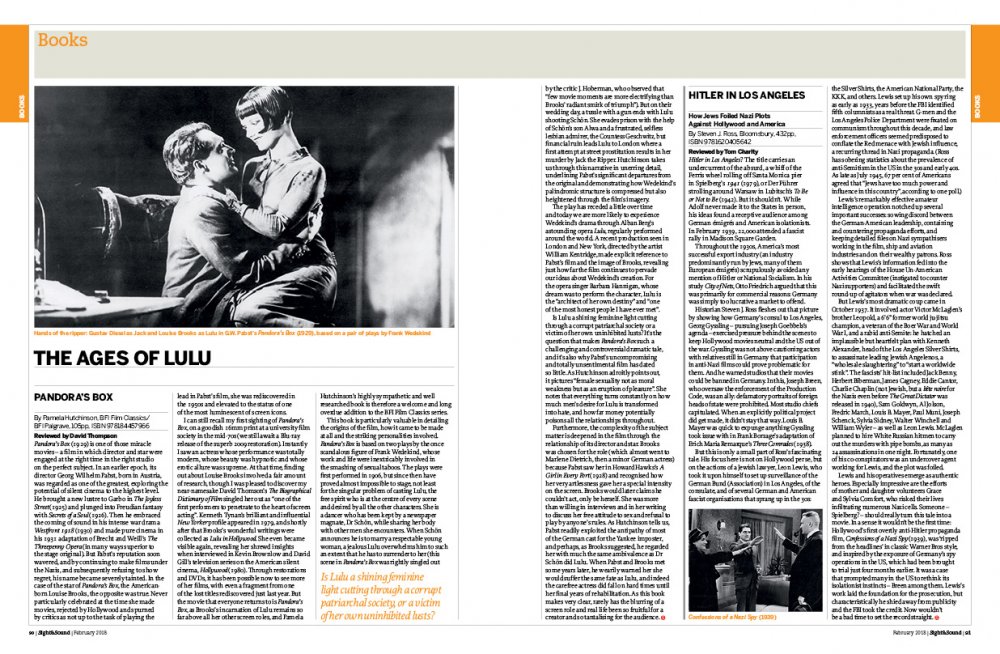
Pandora’s Box by Pamela Hutchinson (BFI Film Classics/ BFI Palgrave) reviewed by David Thompson
Hitler in Los Angeles: How Jews Foiled Nazi Plots Against Hollywood and America by Steven J. Ross (Bloomsbury) reviewed by Tom Charity
Movies That Mattered: More Reviews from a Transformative Decade by Dave Kehr (University of Chicago Press) reviewed by Nick Pinkerton
The Films of Terence Fisher: Hammer Horror and Beyond by Wheeler Winston Dixon (Auteur) reviewed by Jonathan Rigby
I Am (Not) a Number: Decoding The Prisoner by Alex Cox (Kamera Books) reviewed by Tim Hayes
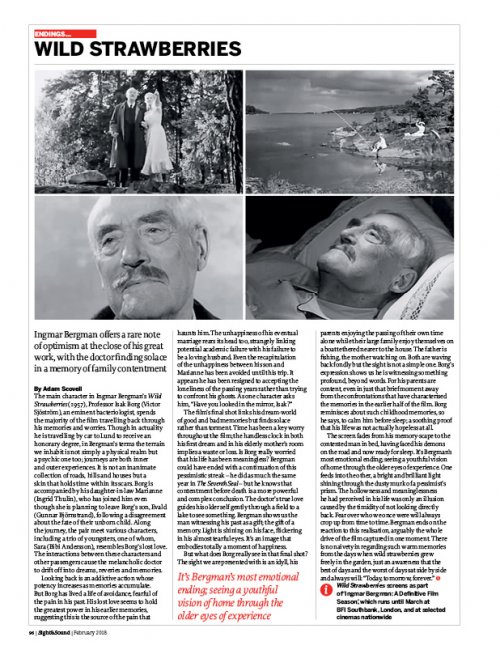
Our Endings section
Letters
Endings
Wild Strawberries
Ingmar Bergman offers a rare note of optimism at the close of his great work, with the doctor finding solace in a memory of family contentment. By Adam Scovell.
Further reading
-
The Digital Edition and Archive quick link
Log in here to your digital edition and archive subscription, take a look at the packages on offer and buy a subscription.




